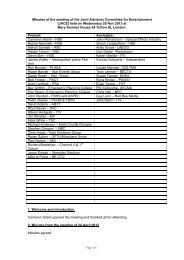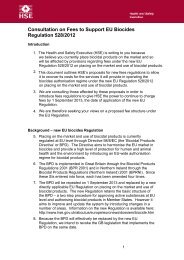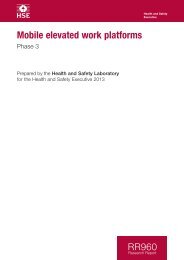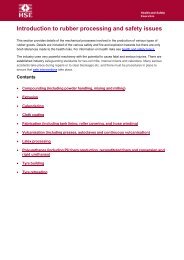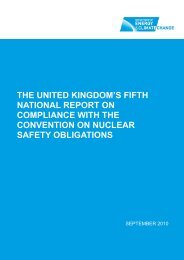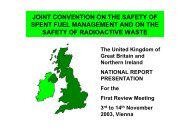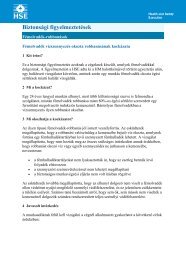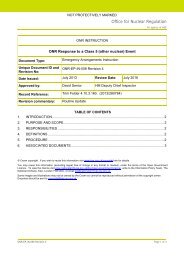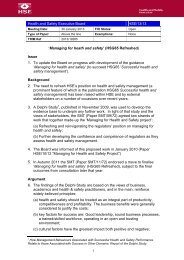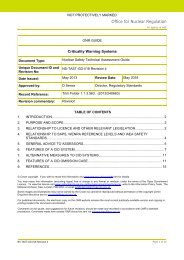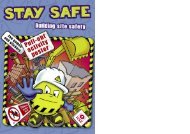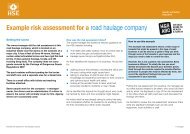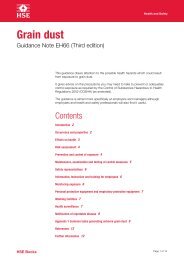indg329 - Benzene and you - HSE
indg329 - Benzene and you - HSE
indg329 - Benzene and you - HSE
Create successful ePaper yourself
Turn your PDF publications into a flip-book with our unique Google optimized e-Paper software.
Health <strong>and</strong> Safety<br />
Executive<br />
How can it get into <strong>you</strong>r body?<br />
<strong>Benzene</strong> can be absorbed into <strong>you</strong>r body if <strong>you</strong>:<br />
■■<br />
■■<br />
■■<br />
breathe in air containing benzene vapour;<br />
absorb it through <strong>you</strong>r skin;<br />
swallow material containing it.<br />
What are the health hazards?<br />
The effects on <strong>you</strong>r health depend on how much benzene <strong>you</strong> are exposed to <strong>and</strong><br />
for how long.<br />
As with other organic solvents, immediate effects of a single exposure to a high<br />
concentration (hundreds of ppm <strong>and</strong> more) can include:<br />
■■<br />
■■<br />
■■<br />
■■<br />
headache;<br />
tiredness;<br />
nausea;<br />
dizziness.<br />
<strong>Benzene</strong> can also cause unconsciousness if exposure is very high (thous<strong>and</strong>s of<br />
ppm).<br />
Long-term exposure to lower concentrations of benzene can result in:<br />
■■<br />
■■<br />
bone marrow suppression leading to serious blood disorders such as anaemia;<br />
cancer – forms of leukaemia <strong>and</strong> other white-blood-cell cancers.<br />
What does <strong>you</strong>r employer have to do?<br />
The Control of Substances Hazardous to Health Regulations 2002 (COSHH) require<br />
<strong>you</strong>r employer to:<br />
■■<br />
■■<br />
■■<br />
■■<br />
■■<br />
■■<br />
■■<br />
assess the risks to <strong>you</strong>r health <strong>and</strong> identify the precautions needed for <strong>you</strong>r<br />
protection;<br />
prevent <strong>you</strong> being exposed to benzene, or where this cannot reasonably be<br />
done, adequately control <strong>you</strong>r exposure;<br />
reduce <strong>you</strong>r exposure to benzene so far as is reasonably practicable, <strong>and</strong> in<br />
any case, below the workplace exposure limit (WEL) assigned for benzene of 1<br />
part per million (ppm) of air averaged over an 8-hour period;<br />
maintain all fume <strong>and</strong> dust controls in efficient working order;<br />
find out how much benzene <strong>you</strong> are exposed to, normally through a monitoring<br />
programme, <strong>and</strong> tell <strong>you</strong> the results;<br />
arrange any health checks that are needed;<br />
inform, instruct <strong>and</strong> train all employees who may be exposed to benzene.<br />
What does ‘reasonably practicable’ mean?<br />
An explanation of what ‘reasonably practicable’ means is provided at www.hse.gov.<br />
uk/risk/faqs/htm.<br />
<strong>Benzene</strong> <strong>and</strong> <strong>you</strong> Page 2 of 4



